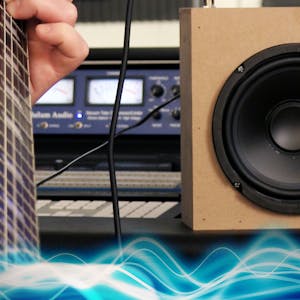In Fundamentals of Audio and Music Engineering: Part 1, students will explore the basic concepts of acoustics and electronics and their practical applications in understanding musical sound and creating music with electronic instruments.
Through a comprehensive curriculum, learners will gain a deep understanding of sound waves, musical sound, basic electronics, and the utilization of these principles in amplifiers and speaker design. The course also covers topics such as electrical circuits, impedance matching, spectral analysis, loudspeaker design, and guitar amplifier construction.
Throughout the course, students will be equipped with the knowledge to explain fundamental acoustics concepts and apply these principles to the creation of music and sound. They will develop the skills to analyze and design electronic systems for musical applications, expanding their proficiency in this specialized field.
Certificate Available ✔
Get Started / More Info
This comprehensive course covers a wide array of topics including sound waves, electrical circuits, spectral analysis, and the design of amplifiers and speakers for musical applications.
The first module introduces students to the fundamental concepts of acoustics and electronics. Topics covered include oscillations, auditory perception, electrical circuits, and volume control.
Module 2 delves into the exploration of acoustic resonance and electrical circuits. Students will learn about resonant modes of a string, reverberation, power and energy, and the application of filters to frequency spectra.
In Module 3, students will study essential mathematical concepts and their application in AC circuit analysis. The module covers derivatives, complex numbers, phasors, and impedance analysis of RL circuits.
Module 4 focuses on AC signals and the design of loudspeakers. Students will explore Fourier series, overtone spectrums, spectral analysis, and the electromechanical model of a loudspeaker.
Module 5 entails the design of closed box and ported loudspeakers. Students will learn about the considerations and tradeoffs involved in loudspeaker design, as well as the parameters for ported loudspeakers.
The final module explores the analysis and design of guitar pickups and amplifiers. Topics include volume and tone control, RLC bandpass filters, distortion stage analysis, and practical considerations in constructing the amplifier.
This specialization equips engineers and scientists with essential skills in image processing using MATLAB. Gain expertise in detecting and analyzing regions of...
Battery Comparison, Manufacturing, and Packaging: Gain insight into battery management systems, cell balancing, and state of charge and health estimation.
This course delves into the analysis and design of magnetic components for power electronic converters, equipping learners with the skills to understand, model,...
This course offers a comprehensive exploration of transmission line design, modeling, and performance assessment, equipping participants with theoretical knowledge...